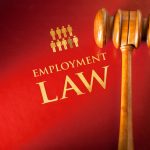An Ounce of Prevention: Ten Questions for Employers to Help Assess their Compliance with Employment Laws
By Daniel Wong, John Wilkinson, Max Skrow – Weirfoulds Law
 Employers have faced no shortage of challenges and obstacles in complying with employment and workplace laws and regulations, particularly given the rapidly shifting employment landscape and ever-changing health and safety requirements during the COVID-19 pandemic. However, while COVID-19 has been the focus of many employers’ recent compliance efforts, that does not excuse businesses from complying with all other applicable employment laws and health and safety requirements.
Employers have faced no shortage of challenges and obstacles in complying with employment and workplace laws and regulations, particularly given the rapidly shifting employment landscape and ever-changing health and safety requirements during the COVID-19 pandemic. However, while COVID-19 has been the focus of many employers’ recent compliance efforts, that does not excuse businesses from complying with all other applicable employment laws and health and safety requirements.
WeirFoulds has prepared the following ten questions that employers can use to gauge their level of compliance with various employment and workplace laws and regulations:
Question 1: Have you reviewed your employment agreements and templates in terms of their enforceability and up-to-date status?

You may be using templates that are outdated, based on the laws of other jurisdictions, or unenforceable in light of recent jurisprudence. Also, a recent decision of the Ontario Court of Appeal (Waksdale v Swegon North America Inc.; application for leave to appeal dismissed by Supreme Court of Canada) reached a conclusion that has the potential to render employment agreements, which were previously thought to be enforceable, unenforceable. As the legal landscape shifts, employers should be satisfied that their agreements and templates are keeping up.
Question 2: Have you established hiring practices which minimize the risk of liability under human rights legislation for discrimination or failure to accommodate?
As with all areas of law, human rights jurisprudence is always evolving, and Courts and Tribunals are always recognizing new situations in which discrimination could occur. At the same time, human resources experts continue to publish articles and studies about effective, efficient, and non-discriminatory ways to screen, interview and hire candidates. It is in the interest of employers from both a risk mitigation and an operations perspective to stay up to date on such matters.
Question 3: Are you meeting your obligations regarding policy development and posting of information as required?
Employers are required to develop certain policies (e.g. health and safety policies, workplace violence and harassment policies), and to post in the workplace documents regarding those policies as well as other important health and safety information.
Question 4: Have you provided your employees with the required health and safety training?

Employers are required by occupational health and safety legislation to provide employees with certain information and instruction. For example, under Ontario’s Occupational Health and Safety Act, employers are required to ensure that employees complete certain basic health and safety awareness training and to provide information and instruction on the contents of their workplace harassment and violence policies and programs. Additionally, the ongoing COVID-19 pandemic may necessitate additional health and safety measures, including additional training.
Question 5: Have you put in place adequate investigation procedures?
Employers in Ontario are required to develop and maintain programs to implement their workplace violence and harassment policies that include the investigation of reports of workplace harassment and violence. An established complaint and investigation process can facilitate addressing other types of workplace concerns and complaints in a timely and effective manner. Employers should similarly be prepared to investigate and respond to a positive COVID-19 case amongst workers in the manner and timelines required by the provincial/territorial government in the jurisdictions in which they operate.
Question 6: Are your employee handbooks or policies up to date?
Employers should have policies that are appropriate for the workplace and comply with applicable laws and regulations. Depending on the relevant rules, it is also important that these policies be brought to the attention of employees, and either be provided to employees or be readily accessible.
Question 7: Do you have established and effective attendance management practices?
Businesses should have a process in place to manage employee absences and accommodation requests. In the context of the ongoing pandemic, businesses should also ensure that they are prepared to adequately monitor employee attendance at the workplace, and to respond to address absences from work due to employee concerns regarding COVID-19.
Question 8: Are your document retention and disclosure policies in line with statutory requirements?
Employers are obligated to retain certain employee-related documents for specified time periods, often for years after the employee ceases working for the employer. Employers must also take steps to handle documents and other information in a manner that is compliant with applicable privacy legislation.
Question 9: Have you properly classified your employees as either overtime exempt or overtime eligible?
Employers often determine an employee’s eligibility or exemption from the applicable overtime pay requirements based on incorrect criteria. Overtime eligibility and misclassification can create significant wage and hour liability for employers.
Question 10: Are your employers and contractors properly classified?
Businesses should beware of the risk of engaging individuals as independent contractors who are, at law, employees. Doing so may result in significant employment law and tax liabilities on the part of an employer. The line between an employee, a dependent contractor, and an independent contractor is not clear in every case. Employers should review the terms under which they have engaged personnel so that the relationships reflect the intentions of those involved.
The above list is an example of some of the issues an employer should consider when assessing its compliance with employment laws and regulations. WeirFoulds has developed our flexible and targeted Employer Compliance Audit Program to assist employers with their efforts to achieve and maintain compliance with their obligations under the applicable employment laws and regulations. For more information about the Employer Compliance Audit Program, please contact Partner Daniel Wong at dwong@weirfoulds.com.
The information and comments herein are for the general information of the reader and are not intended as advice or opinion to be relied upon in relation to any particular circumstances. For particular application of the law to specific situations, the reader should seek professional advice.
